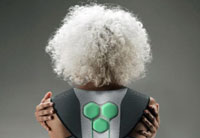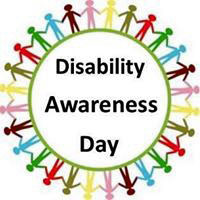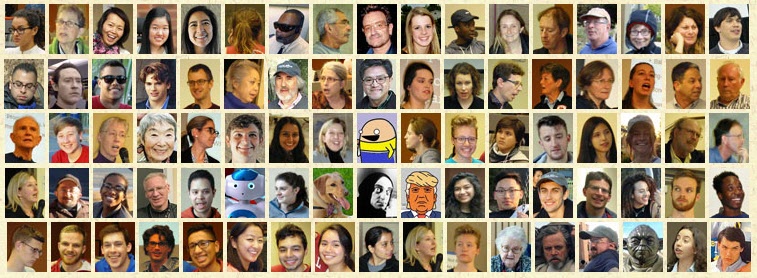| |
|
|

|
|
ATLAS |
|
|
Assistive
Technology
Laboratory
at
Stanford |
|
|
|
Technology
and design benefitting individuals with disabilities and older adults in the
local community |
September 18, 2018 |
|
|
|
|

Perspectives is the newsletter of the
Stanford course,
Perspectives in Assistive
Technology.
Upcoming Abilities
Expo
|
Perspectives in Assistive Technology is a Winter
Quarter Stanford course - preparing for its thirteenth year - that
explores the design, development, and use of assistive technology that benefits
people with disabilities and older adults. It consists of semi-weekly classroom
discussions; lectures by notable professionals, clinicians, and
assistive technology users; tours of local medical, clinical, and
engineering facilities; student project presentations and demonstrations; an
assistive technology faire; and a film screening. |
This course relies on your involvement,
so please suggest a
project based upon an identified problem or challenge.
Course
News
Request for additional student
project suggestions - Project suggestions are continuing to be
solicited. For more information refer to the
Call for Team Projects
Suggestions webpage.
Approved student project
suggestions - Several project suggestions are in the process of
being formulated, received, reviewed, and approved to be candidate projects
this coming academic year.
Confirmed guest lecturers and
field trips - Field trips to the VA Spinal Cord Injury Center and
the Magical Brisge Playground have been confirmed. Katherine Strausser will be
making a return guest lecture appearance. The dates of their presentations as
well as the field trips have not yet been scheduled.

Review of Project
Solicitation Process and Activities
Briefly, what is
the process for considering and submitting project suggestions? -
First identify a specific challenge or problem experienced by a person with a
disability or older adult. Then perform an internet search to confirm that the
problem has not already been adequately addressed. Then carefully review the
project requirements to make
sure the idea complies with all the criteria. Finally submit a short email -
text format is ok - that identifies the user or population affected and briefly
describes the nature of the problem. Include desirable features of a solution,
but do not specify how the device should appear, be built, or solve the problem
- as those are tasks for the student team to consider. It is ok if the problem
affects just one individual.
Unsuitable Project
Suggestions - In an effort to improve future project suggestions, I
thought it would be informative to provide some unsuitable examples with
explanations.
- I
have a family member with a disability who lives on the east coast
...
The person with a disability who experiences a challenge or
problem must be available locally (within 25 miles) to work with the student
project team to further illustrate the problem, offer advice during the
quarter, and test the students' prototypes. Someone who lives outside the local
area may not be able to work effectively with the project team.
- Here
are some projects off the top of my head ...
Projects must be
well-considered and based upon an observed problem or challenge. You are
welcome to contact me with your initial ideas to get a quick determination if
you are on the right track.
- Can
you offer a project to prevent falls in older adults?
Student
prototypes must no pose a risk of harm to the user, so a project addressing
this problem really is not suitable as the prototype may fail to prevent a
fall.
- Commercial prosthetic devices are very expensive. Can you come
up with a less expensive design?
Prosthetic devices are expensive
because they are made in small numbers and are custom fitted by a professional
prosthetist. In addition, the fitting process may require multiple visits.
Medical devices such as these also incur a high product liability insurance
premium which figures into the price.
- I
haven't seen a commercial device that solves this problem ...
Please
perform an internet search for commercially available products before
suggesting a project.
- How
about designing a way to call an elevator or open an electric door or press a
street crossing signal with a wireless push button on my
wheelchair?
Students will be unable to obtain permission to modify
an elevator call button or a street crossing signal.
What happens after
a project suggestion is submitted? - Even if you have submitted
project suggestions that weren't accepted, I would encourage you to consider my
comments and offer new or revised ideas.
What happens after
a project suggestion is submitted? - Submitted project suggestions
will be read, reviewed, and considered. Those that meet all the project
requirements and receive my approval will be accepted as candidate team
projects. A project Problem Statement describing the challenge will be
composed for posting on the course website and disseminated as a handout to
students on the first day of class. Refer to
this past year's team candidate project
list for examples of past Problem Statements.
What is the
deadline for submitting project suggestions? - Please email
suggestions to me as soon as possible so I have adequate time to consider all
submissions, edit approved entries, and post them - not later than Saturday,
December 1st. Feel free to contact me before the deadline to discuss your
ideas and suggestions.
Local
Events
Opportunity to
Learn about Powered Clothing

Learn about Powered Clothing
The
Avenidas
Generations Lab is recruiting older adults to provide input to improve
Seismic's line of powered
clothing.
Seismic is an apparel company, located in Menlo Park, that seeks to
transform people's relationship with clothing that enhances one's ability to
move through life. Their goal is to shape human potential through a new
integration of apparel and robotics called Powered Clothing™. Powered
Clothing™ enables everyone - from older adults to athletes to people with
a wide range of physical disabilities - to achieve their full mobility
potential.
To
learn more, schedule a one-hour appointment through Avenidas with Eric Gee by
email or phoning him at
650/289-5409.
Older
adults will be paid $25 to attend an initial orientation and selected
individuals will be paid for each hour of future participation.
The
initial orientation includes:
- Watching a
video that introduces Seismic and Powered Clothing™
- Learning about
enrollment opportunities for Seismic's user testing program
- Be measured
and fitted for a Seismic garment (selected individuals)
Ideal
Powered Clothing™ users are those who:
- Experience
difficulty with activities such as standing up from a seated position, climbing
stairs, bending, etc
- Are active,
engaged individuals
- Have a body
mass index (BMI) less than 30
|
|
Disability-Related
Movie

Don't Worry, He Won't Get Far on Foot
Is it
possible to find humor - corrosive, taboo-shattering, laugh-till-you-cry humor
- in the story of a 38-year-old- cartoonist who’s both a quadriplegic and
a recovering alcoholic? The answer is yes, if the cartoonist is John Callahan -
whose infamous work has graced the pages of Omni, Penthouse, and The New Yorker
- and if he’s telling it in his own words and pictures. But
Callahan’s uncensored account of his troubled - and sometimes impossible -
life is also genuinely inspiring. Without self-pity or self-righteousness, this
liberating book tells us how a quadriplegic with a healthy libido has sex, what
it’s like to live in the exitless maze of the welfare system, where a
cartoonist finds his comedy, and how a man with no reason to believe in
anything discovers his own brand of faith.
Don’t Worry is based on John Callahan’s memoir of
the same name. Phoenix plays the controversial cartoonist as he struggles with
alcoholism and recovers from a car accident that leaves him paralyzed from the
waist down. The supporting cast includes Rooney Mara, Jonah Hill, and Jack
Black. Van Sant debuted the drama at Sundance earlier this year, where Phoenix
instantly became an early contender for the Oscars. The actor gives a
transformative performance in the lead role, but it’s really Jonah Hill
who walks away with the film. Hill plays Phoenix’s A.A. sponsor Donnie,
and it’s a perfectly calibrated supporting performance, one that makes a
lasting impression and leaves you wanting to know more about the
character.
| When: |
|
Thursday, September 11th through Sunday, September
23rd |
| Where: |
|
3 Below Theaters, San
Jose |
| Information: |
|
113 minutes -
trailer
(2:11) |
|
|
San José
Disability Awareness Day

11th Annual Disability Awareness Day
“Expanding Our Horizons” as we celebrate diversity,
awareness, and empowerment for persons with differing abilities.
Attend
and enjoy: Live Music, Food Trucks, Movie Screenings, Panel Discussions, Art
Displays, Resource Fair, Games, and Activities
| When: |
|
Tuesday, October 4th from 11am to 2pm |
| Where: |
|
San José City Hall Rotunda & Plaza - 200 E. Santa Clara
St. |
| Information: |
|
Free -
more
information |
|
|
Abilities
Expo

Abilities Expo
The
Abilities Expo is the go-to
source for the community of people with disabilities, their families, seniors,
veterans, and healthcare professionals. This event offers new technologies,
possibilities, solutions, and opportunities. Discover ability-enhancing
products and services, play adaptive sports, learn new dance moves, and attend
informative
workshops.
|
|
Email questions, comments, or
suggestions - Please email
me if you have general questions, comments, or suggestions regarding the
course. Thank you again for your interest.
Dave
|

To unsubscribe from this newsletter, please email
Dave. |
|








